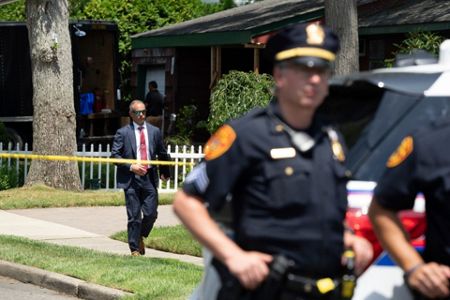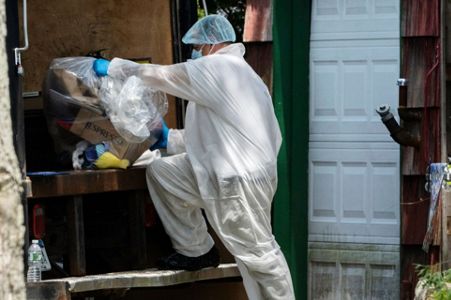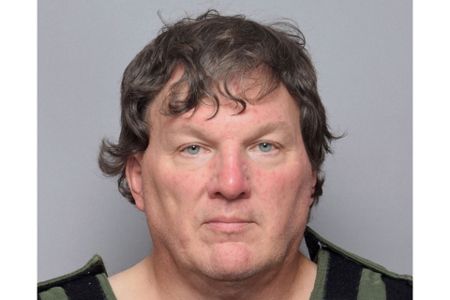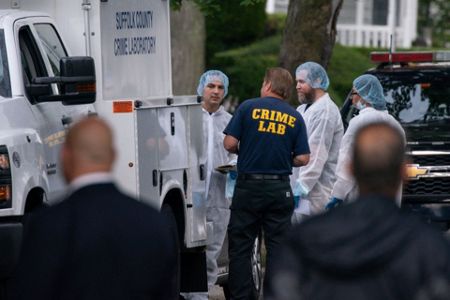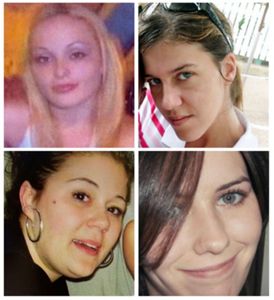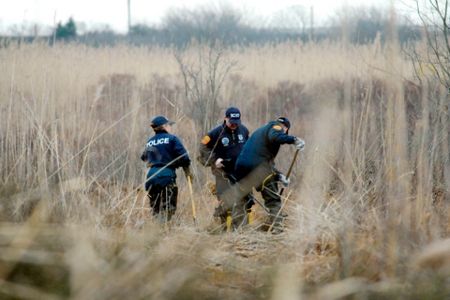MASSAPEQUA PARK, N.Y. (AP) — Detectives on Long Island are hunting for fresh clues about an architect arrested in connection with a string of slayings known as the Gilgo Beach killings. They’re combing through storage units linked to Rex Heuermann and using DNA evidence to see if he’s connected to other cold cases.
The ongoing work Monday marks an important new phase in a multi-agency investigation that — after years of dead ends and frustrations — led prosecutors to charge Heuermann with murder last Friday in the deaths of three of the 11 women whose remains were found buried along a remote beach highway in 2010 and 2011.
Heuermann, who has lived for decades across a bay from where the remains were found, is also considered the prime suspect in the killing of a fourth victim. He has pleaded not guilty. His lawyer said Heuermann denied committing the crimes.
Investigators have said it’s unlikely just one person killed all of the victims, and they insist the probe is far from over after the watershed moment of Heuermann's arrest.
Suffolk County Police Commissioner Rodney Harrison, who spearheaded the creation of an interagency task force last year to solve the Gilgo Beach killings, has vowed that authorities will “work tirelessly until we bring justice to all the families involved.”
“We’re just in the infancy of the work that needs to be done going forward,” Deputy Commissioner Anthony Carter told The Associated Press on Monday.
Detectives executed a search warrant at Omega Self Storage in Amityville on Sunday and searched another nearby storage facility on Monday. Both are less than a 10-minute drive from Heuermann’s home
This followed a multi-day search at Heuermann's house in Massapequa Park, about a 25-minute drive across a causeway spanning South Oyster Bay to the sandy stretch known as Gilgo Beach where the women's remains were found. That search yielded more than 200 guns, Harrison told Fox News on Monday.
Investigators were also checking to see if Heuermann's DNA — obtained from pizza crust he disposed and linked to genetic material found on a Gilgo Beach victim's remains — connected him to other unsolved cases.
Heuermann, 59, is charged with killing Melissa Barthelemy, Megan Waterman and Amber Costello. Authorities are continuing to work toward charging him in the death of a fourth victim, Maureen Brainard-Barnes, said Suffolk County District Attorney Ray Tierney.
Most of the victims were young women who had been sex workers. Their deaths long stumped investigators, and the mystery fueled immense public attention and led to a 2020 Netflix film, “Lost Girls.”
Harrison, the NYPD’s former chief of detectives and chief of department, made solving the Gilgo Beach killings one of his top priority when he was appointed police commissioner in January 2022.
Harrison soon formed the Gilgo Beach Homicide Investigation Task Force, convincing the FBI, state police and local departments to commit their top investigators full time to the effort. Harrison assigned longtime Gilgo Beach investigator Detective Lt. Kevin Beyrer to lead the probe.
“His goal was not to move the case forward, his goal was to solve the case,” said Carter, who moved to the Suffolk County department with Harrison from the NYPD.
Task force investigators started working out of a dedicated space at a Suffolk County police facility, an open space with no offices so they could share ideas and information.
Within six weeks of their first meeting, task force investigators identified Heuermann as a suspect — using a vehicle registration database to connect him to a Chevrolet Avalanche pickup truck that a witness reported seeing when one of the victims disappeared.
Some of the victims were believed to have disappeared from Massapequa Park, and their cell phones were found to have pinged towers in the area.
The truck discovery unlocked other investigative tools.
A grand jury authorized more than 300 subpoenas and search warrants, allowing the task force to dig into Heuermann's life. They collected billing records for burner phones he allegedly used to arrange meetings with the victims, retested DNA found with the bodies, and combed Heuermann's internet search history, which showed intense interest in the Gilgo Beach killings and the renewed investigation.
In January, a task force surveillance team tailing Heuermann in Manhattan watched as he threw the remnants of his lunch — a box of partially eaten pizza crusts — into a sidewalk garbage can. Investigators rushed in, grabbed the box, and sent it to the crime lab, which matched the DNA from Heuermann’s afternoon nosh to a male hair found on burlap used to restrain one of the victims.
The results of that testing came back on Tuesday, two days before Heuermann’s arrest.
“There were some questions about the task force — that the mission of the task force is now complete because we’ve affected an arrest,” Carter said. “Everything is in its infancy still. This is just part of it. There’s so much more work that needs to be done in terms of additional investigation, additional interviews, analyzing evidence, and on and on.”
“There are still a lot of victims, and we need to continue to try to bring justice for all of them," he added. “That's super important to all of us, and super important to the Suffolk County Police Department.”
___
Associated Press reporter Karen Matthews contributed to this report.
___
Follow Michael Sisak on Twitter at twitter.com/mikesisak and send confidential tips by visiting https://www.ap.org/tips/
Copyright 2023 The Associated Press. All rights reserved. This material may not be published, broadcast, rewritten or redistributed without permission.




